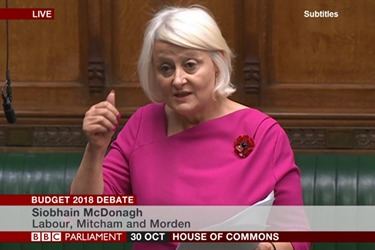
Austerity suspended, but not ended… but for now it
continues to proceed, dragging almost a decade of damage in its wake. The
Chancellor has delivered this year’s budget, with a misleading promise
that this is the beginning of the end of the era of austerity.
Unfortunately, as always, the devil is in the detail and
reading through the budget it is clear that these are warmer words than
actions. The Institute for Fiscal Studies warns that public services will
continue to feel squeezed for some time to come and that there are still £4
billion of cuts to welfare spending working their way through the system.
Here’s a brief summary of what has (and hasn’t) been
promised:
NHS and Mental
Health: Let’s start with the good news. The Chancellor has announced
that there will be £2bn allocated towards mental health, including a new 24
hour mental health hotline. This is long overdue and should be welcomed.
However, although the NHS budget is set to increase, spending on public health,
and doctors' and nurses' training in England, is set to fall next year. The
Health Foundation has said that it is ‘simply not enough’.
Tax and Universal Credit Changes: We all know the shambles that has been the Universal Credit
roll out and the Chancellor was under pressure from all sides to make tangible
changes for the thousands who have been negatively impacted. His budget
increases work allowances in Universal Credit by £1,000 per year but there are
still families who will be up to thousands of pounds a year worse off under
this rolled out system. The £1.7bn promised for Universal Credit is less than a
third of the £7bn of social security cuts still to come. Meanwhile, headline
income tax cuts for millions of workers are welcomed, though the Resolution
Foundation, has calculated that this is a policy for the rich, with poorer
families about £30 a year better off from the tax cuts, with the top 10%
earners £410 better off.
Policing: Police, teachers, nurses
and doctors have had no reassurances that the public sector pay squeeze will
end this year. Outside of counter-terrorism policing, not a single new penny
was put aside for our police forces, with budgets and resources clearly
stretched across the country. We all know that we need more bobbies on the beat
in order to keep our communities safe, with 21,000 police cut and violent crime
on the rise.
Schools: Under
this Government, schools in Merton are set to lose a staggering
£1,820,818 between 2015 and 2020, despite 40% of primary schools and 60% of
secondary schools in the borough having had to cut staff since 2014. The total
of just £10,000 to each Primary School in this budget is pennies in comparison
to the challenges that they face.
Worker’s Rights: The
Chancellor stated that ‘delivering higher wages for those in work is core to
his mission’, but my question to him would be: at what cost? For our National
Living Wage is littered with loopholes, and used by some of the biggest
organisations to cut terms, conditions and salaries. A toxic combination of
falling real wages, frozen benefits and insecure work has resulted in 8 million
people in working households living in 21st century poverty.
Housing: For a
supposed Government priority, I was expecting a little more than the few lines
that we heard considering a staggering £1.1 billion of taxpayer’s money is
spent on temporary accommodation every single year. I welcome the lifting of
the Housing Revenue Account (HRA) cap, but what about those Councils like Merton
who do not have a HRA? We should welcome all new promised measures and money
but the small changes offered by the Chancellor are simply not of a scale that
will make the difference that we all know is so desperately needed to solve our
housing crisis.
Council Budget: And
don't be fooled by the Chancellor's claim of an extra £650m for adult social
care – he is also making a £1.3bn cut to council budgets next year. So,
overall, he is still actually cutting £650m! This for Councils that already
face a funding gap of £7.8bn by 2025!
You can watch my speech at the Budget debate
here: